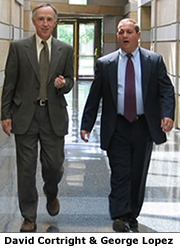
The State Department’s new annual report shows that the U.S. is losing the “global war on terror,” according to analysts George Lopez and David Cortright of Notre Dame’s Kroc Institute for International Peace Studies.
In 2006, the number of terrorist attacks nearly doubled in Iraq and rose 53 percent in Afghanistan, according to the report. During the year, worldwide fatalities from terrorist attacks rose to more than 20,000.
“These stark data demonstrate that something is dreadfully wrong with the current strategy,” Lopez said. “Despite years of military operations, thousands of U.S. combat deaths and hundreds of billions of military expenditure, the number of terrorist attacks and suicide bombings is on the rise.”
Lopez and Cortright have conducted research and advised European and United Nations agencies on counter-terrorism since 2002. They present their findings and policy prescriptions in their co-edited book, “Uniting Against Terror: Cooperative Nonmilitary Responses to the Global Terrorist Threat,” which will be released by MIT press this fall.
Terrorist attacks were most prevalent precisely where the U.S. has deployed the largest number of troops, Lopez pointed out.
“The extensive American military presence in Iraq, Afghanistan and other Muslim countries seems to foster the very conditions that lead to recruitment of new bands of terrorists,” he said. “Policies of an over-reliance on military force and occupation have turned Iraq and Afghanistan into training grounds for Al-Qaida-linkedterrorists and have inspired a rising wave of jihadist extremism across three continents.”
The struggle against terrorism is primarily a political battle for the hearts and minds of ordinary people around the world, Lopez said.
“Winning the fight against terrorism will require bold new policies that rely less on the presence of military forces and more on cooperative political, diplomatic, economic and law enforcement strategies,” he said. “Policies like the current troop surge in Iraq will never succeed unless the diplomatic and economic initiatives to engage neighboring states in a regional solution unfold with similar political will and resources.”
Notre Dame’s Kroc Institute is dedicated to understanding the causes of violent conflict and promoting the conditions for sustainable peace. Lopez is a senior fellow at the institute and Cortright is president of the Fourth Freedom Forum and a Kroc Institute research fellow.
Media Advisory: The above may be used all or in part. George Lopez and David Cortright also are available for further comment. Lopez: lopez.1@nd.edu or 574-631-6972; Cortright: David.B.Cortright.1@nd.edu or 574-631-8536.
Originally published by at newsinfo.nd.edu on May 15, 2007.